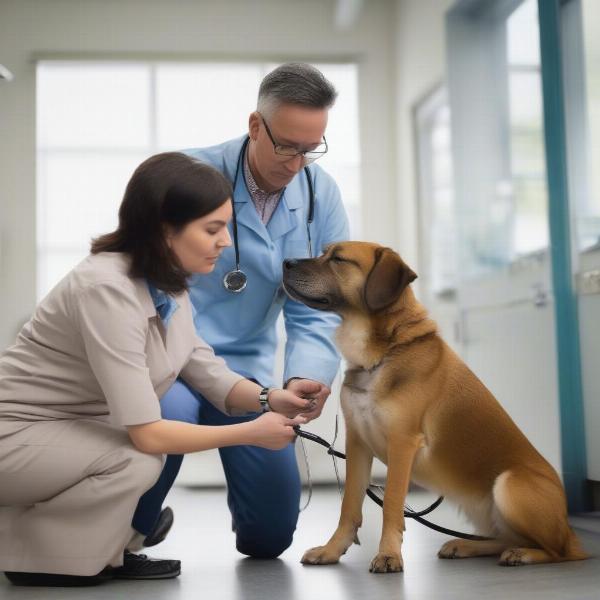A shaking dog who refuses food is a serious cause for concern. This behavior can signal a range of health issues, from relatively minor problems to life-threatening conditions. Understanding the potential reasons behind your dog’s shaking and loss of appetite is crucial to getting them the help they need. This article will explore the common causes, symptoms to watch for, and when to seek immediate veterinary care.
Possible Causes of Shaking and Loss of Appetite in Dogs
Several factors can contribute to a dog shaking and refusing to eat. Let’s delve into some of the most common culprits:
Illness and Infections
- Parvovirus: This highly contagious viral infection often causes severe vomiting, diarrhea, and loss of appetite, accompanied by shaking and lethargy.
- Kennel Cough: While primarily affecting the respiratory system, kennel cough can also lead to decreased appetite and shaking due to discomfort.
- Distemper: This viral illness can manifest in various ways, including neurological symptoms like shaking, seizures, and a loss of interest in food.
- Pancreatitis: Inflammation of the pancreas can cause intense abdominal pain, leading to shaking, vomiting, and refusal to eat.
- Kidney Disease: Kidney problems can result in nausea, vomiting, and loss of appetite, often accompanied by weakness and trembling.
Pain and Injury
- Broken Bones or Sprains: Physical trauma can cause significant pain, making your dog reluctant to move or eat, and they may shake due to the pain and shock.
- Arthritis: Chronic pain from arthritis can lead to stiffness, discomfort, and decreased activity levels, affecting their appetite and potentially causing trembling.
- Dental Problems: Toothaches or gum infections can make eating painful, resulting in loss of appetite and shaking from discomfort.
- Abdominal Pain: Issues like bloat or intestinal blockages can cause severe pain, leading to shaking, vomiting, and refusal to eat.
Anxiety and Stress
- Fear and Phobias: Loud noises, thunderstorms, or unfamiliar environments can trigger anxiety and shaking, causing a temporary loss of appetite.
- Separation Anxiety: Dogs experiencing separation anxiety may exhibit excessive shaking, pacing, and destructive behavior, often accompanied by a refusal to eat.
Other Potential Causes
- Hypoglycemia (Low Blood Sugar): This condition can cause weakness, shaking, and confusion, leading to a decreased appetite.
- Toxicity or Poisoning: Ingesting poisonous substances can trigger a variety of symptoms, including shaking, vomiting, and loss of appetite.
- Neurological Disorders: Certain neurological conditions can cause tremors, shaking, and changes in behavior, including eating habits.
- Medication Side Effects: Some medications can have side effects such as nausea, vomiting, or loss of appetite, which may be accompanied by shaking.
When to Seek Veterinary Care
If your dog is shaking and not eating, it’s essential to contact your veterinarian immediately. This combination of symptoms can indicate a serious underlying issue that requires prompt diagnosis and treatment. Don’t delay seeking professional help, especially if you notice other symptoms such as vomiting, diarrhea, lethargy, or difficulty breathing.
What to Expect at the Vet
Your veterinarian will perform a thorough physical examination and ask about your dog’s medical history. They may recommend diagnostic tests such as blood work, urine analysis, X-rays, or ultrasound to determine the cause of the shaking and loss of appetite. Based on the diagnosis, they will develop a tailored treatment plan for your dog.
Tips for Helping Your Shaking, Non-Eating Dog
While awaiting veterinary care, you can try a few things to comfort your dog:
- Offer small amounts of bland food: Try boiled chicken and rice or plain cooked sweet potato.
- Ensure access to fresh water: Dehydration can worsen symptoms.
- Provide a quiet, comfortable space: Minimize stress and create a calm environment.
- Keep them warm: Use blankets or a heating pad to help maintain their body temperature.
 Veterinarian Examining a Dog
Veterinarian Examining a Dog
Conclusion
A dog shaking and not eating is a clear sign that something is wrong. While it’s tempting to try home remedies, it’s crucial to consult a veterinarian for a proper diagnosis and treatment plan. By addressing the underlying cause promptly, you can help your furry friend recover quickly and return to their usual happy and healthy self. Remember, early intervention is key to a positive outcome.
FAQ
- My dog is shaking slightly but seems otherwise normal. Should I be worried? While slight tremors can sometimes be normal, especially in older dogs or certain breeds, it’s best to consult your vet to rule out any underlying health concerns.
- Could my dog be shaking from being cold? Yes, dogs can shiver when cold, but if the shaking is accompanied by loss of appetite, other symptoms should be considered.
- How can I prevent my dog from getting sick? Regular veterinary checkups, vaccinations, proper nutrition, and a safe environment can help minimize the risk of illness.
- What should I do if my dog eats something toxic? Contact your veterinarian or animal poison control immediately.
- Can stress really cause my dog to stop eating? Yes, stress and anxiety can significantly impact a dog’s appetite and overall well-being.
- What if my dog won’t eat the bland food I offer? Consult your vet, who might recommend other dietary options or suggest syringe feeding.
- How long will it take for my dog to recover? The recovery time depends on the underlying cause and the individual dog’s response to treatment.
ILM Dog is your trusted source for comprehensive dog care information. We offer expert advice on everything from breed selection and health care to training, nutrition, grooming, and much more. If you have any questions or concerns about your dog’s health or well-being, don’t hesitate to contact our team of experts. Email us at [email protected] or call us at +44 20-3965-8624. ILM Dog is committed to providing you with the knowledge and resources you need to ensure your furry friend lives a long, happy, and healthy life.